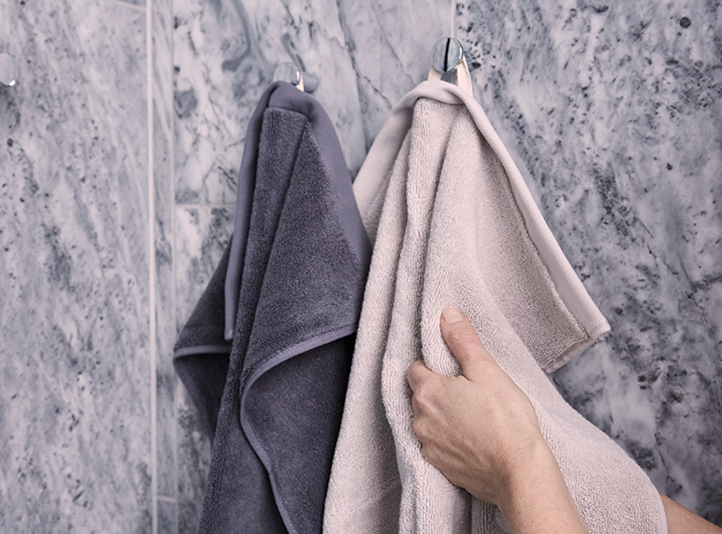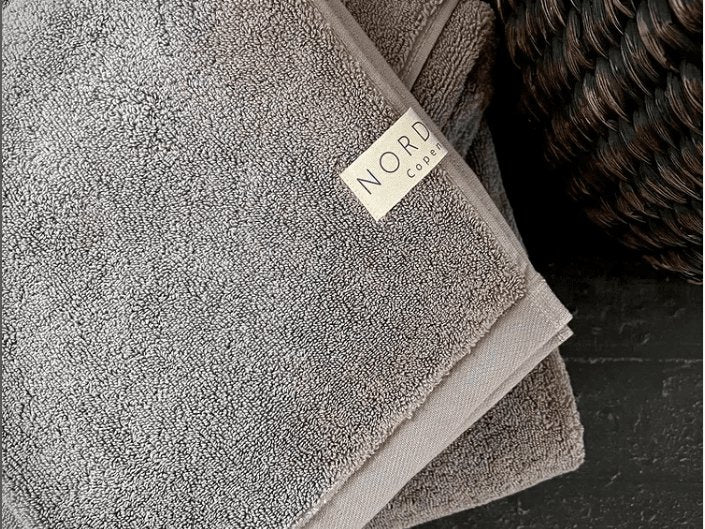
Organic Towels Are Sustainable Towels: How Can Nordifakt Help You AND the Environment?
Focus is shifting more and more to ways in which we can live smarter, cleaner, and help the environment. The reality is that we all need to do our small bit to help our future world. One way in which consumers and companies can both do their part is to use and manufacture more sustainable products. Read more here on the sustainable offerings of Nordifakt.
Sustainable living has become a top-of-mind priority for both consumers and for green-conscious companies. As the environmental crisis worsens, nearly every industry is wondering how they can alleviate the strain on our planet. Thankfully, the textile industry is leading the charge here, pushing for organic towels and other garments to help ease the burden.

Statistics suggest that by 2100, the population on Earth will surpass 11 billion. So how do we increase sustainability to help future generations live in a cleaner environment? The key is starting at home. Consumers and companies can both do their part to use and manufacture more sustainable products.
Common Household Products That Harm the Environment
It’s easy to overlook products around the home that might seem harmless at first glance, but a surprising number of household items aren’t actually great for meeting sustainability goals. Some products are made as single-use items and get thrown out almost as fast as they’re purchased. Other products are designed to fail within a period of time, forcing the consumer to replace the item or go without it. Still, others contain harmful chemicals or are non-recyclable, contributing to waste buildup. So what should you look out for around your home?
Paper Towels and Wet Wipes
While paper towels are recyclable, they still contribute to waste buildup—and are easily replaced by reusable, organic towels. The same goes for wet wipes. Rather than tossing a used-up paper towel or wipe in the trash, you can simply wash a reusable towel and have it ready for the next clean-up. With Nordifakt’s self-cleaning sustainable towels, this process is easier than ever before. You can worry less about needing to wash your towels after every use, and focus more on keeping your home clean and smelling fresh.
Synthetic Fabrics
The harsh chemicals used to make synthetic fabrics only add to waste buildup when you throw out products. These materials leach harmful chemicals into the environment and are generally poor for the environment.
Specifically, polyester is one of the worst synthetic fabrics one can use—and it’s everywhere. Derived from petroleum, polyester has been shown to disrupt hormone development and even contribute to breast cancer. Whether you’re wearing synthetic fabrics or throwing them out, they’re simply no good for our environment. Organic towels and other fabric materials such as linen, however, are recyclable and natural, making them the clear choice for sustainability and personal health.
Single-Use Plastics
Single-use plastic is a category where you can make a quick, drastic difference. It’s easy to replace your grocery bags, water bottles, utensils, and other single-use plastic items with reusable versions.
The single-use versions of these items only contribute to waste build-up, as the plastic used to make them doesn’t degrade naturally. This means we’re stuck with this pollution—unless waste disposal plants burn the plastic. But burning plastic is also incredibly harmful to the environment, and releases toxic chemicals into the atmosphere.

Simply purchasing items that you can wash and reuse does wonders for promoting sustainability. Whether it’s a reusable water bottle, a cloth grocery bag, or organic towels, you can save money, reduce waste, and help green your community all at the same time.
Sunscreen
While sunscreen may protect your skin from harmful ultraviolet rays, many sunscreen brands use chemicals that hurt the environment. Oxybenzone, octinoxate, and octocrylene are commonly found in sunscreen products; as you swim in the ocean or shower off, these chemicals leak off your skin and flow into waterways. We collectively wash off nearly 14,000 tons of sunscreen each year, negatively impacting coral reefs and other marine life around the world.
In order to help save the marine life around us, it’s very important to switch to natural sunscreen brands ASAP.
Mattresses
Stacked with flame-retardant chemicals, mattresses are surprisingly terrible for the environment. If you laid every thrown-out mattress side by side, they could circle the Earth. Now imagine what the chemicals in all those mattresses do to the environment as rainwater soaks them and then seeps into local waterways!
How Do Sustainable Home Products Like Organic Linens & Towels Help the Environment?
Consumers are more and more interested in sustainability as the impacts of the climate crisis hit home, as highlighted by a substantial increase in online searches for sustainable products. People want to reflect their values through their purchasing habits—according to one McKinsey survey, as much as 75% of millennials have listed sustainability as a driving factor in making purchases.
In the same survey, 66% of all consumers said that sustainability factored in as a concern when purchasing products. Shoppers across the board are starting to make purchases with more focus on sustainability—but the challenge lies in overcoming research and affordability.
Many products come packaged in large amounts of plastic, which contributes to one of the major pollutant problems we face today. And while some companies may sell sustainable products, their production and delivery process needs to also follow suit.

From paper packaging to longer-lasting, recyclable products, eco-friendly products are on the rise. Organic towels—which last longer and use less water and energy to clean—are a great start. But more items, such as cleaning chemicals, furniture, and even toiletries, need sustainable attention too. From production to delivery (and even at the end of a product’s life), sustainability needs to be at the forefront if we want to help the health of the environment around us.
Why Buy Organic, Eco-Friendly Towels and Home Products?
Buying eco-friendly home products is an easy first step in making your home more sustainable. Organic towels—for the bathroom or the kitchen—are great options because they reduce water waste, and energy waste, and lower your trash production.
Nordifakt sustainable towels and linens can help make your home modern and sustainable at the same time. However, reusable, self-cleaning towels aren’t the only way to improve your home’s eco-friendly footprint. Switching to reusable grocery bags, water bottles, electric vehicles, solar and wind power, and greening other common daily activities all makes steps in the right direction.
However you decide to get on board, you can join the green movement right from home. It’s as simple as just starting to replace your textiles and other daily-use items with more sustainable options.
Six Ways Nordifakt’s Organic, Sustainable Towels Help You and the Environment
Nordifakt is here to help you on your journey to a more sustainable tomorrow. We offer everything from bed linens to bath and kitchen towels, all infused with forward-thinking Polygiene BioStatic Stays Fresh silver salt treatments so you can cut back on the laundry loads and save water and energy. As the technology’s name implies, our sustainable towels and linens stay fresher longer, as the treatment kills 99.9% of all bacteria. So how can Nordifakt towels make your home greener today?
Save on Water and Energy by Washing Less
Many people assume that water is an abundant resource—but surprisingly, this isn’t exactly the case. Only around 1% of the water on Earth is currently suitable for human use. Most of the rest is either salt water or frozen in polar ice caps. Considering this scarcity, saving water at home makes a good first step toward sustainability.

American families on average use 300 gallons of water or more on a daily basis. Washing machines account for roughly 17% of home water use. Finding textiles that don’t add to this figure can help you on your path to sustainability, as can choosing the right laundry machine to save water. For example, front-load machines perform more efficiently than standard top-load washers. Also, you don't necessarily need to wash every garment every time you use it. At Nordifakt, treat our organic towels with silver salt technology to kill bacteria on contact. This means towels can last longer between washes, promoting more sustainable measures at home every time you sort laundry—or don’t.
Less washing means you save on water use—but also on energy. Studies show that we could save as much as 235 million tons of CO2 and 22.5 billion cubic meters of water by skipping every other washer load.
Minimize Garbage With Longer Product Life
Reducing waste by using longer-lasting products makes for a major step toward sustainability. Across industries, companies are working to make their products more environmentally friendly with technology to extend product lifespans.
When it comes to home textiles, antibacterial tech has proved a particularly effective strategy. Towels and other garments break down from wear and tear every time you wash them. By reducing the amount of washing needed, products last longer and stay out of the trash longer.
Nordifakt produces high-quality, smart textiles capable of this self-cleaning, which allows you to cut back on the wash cycles—and makes these products last longer as well. Additionally, these organic towels reduce the number of microplastics released into the environment through washing. Our linens and towels help you make a more sustainable impact on your environment every day.
Planned obsolescence is another issue across many industries—and consumers are tired of it. Replacing products before they need to be swapped out for new versions only increases unnecessary waste. Shopping for products that intentionally cut back on this practice can lead you to a more sustainable lifestyle.
Preventing Synthetic Pollutants by Using Organic Cotton

Non-organic cotton proves a major problem in the fight for sustainable living. Since they require 62% more energy than organic cotton and need far more water to cultivate, synthetic cotton is simply not a sustainable option. However, this cotton makes up half of the fiber used in the textile industry.
This is why at Nordifakt we only use organic cotton, which doesn't rely on synthetic chemicals or harmful pesticides. Organic cotton also doesn't need nearly the same level of irrigation to sustain cultivation. Instead, organic cotton farms rely on rainfall for water, working in tune with natural biological cycles, which promote biodiversity. And without all the harmful chemicals, the soil stays rich for longer and allows for more sustainable growing processes.
Sustainable Linen Production Process
In addition to organic cotton, we use linen in our towels. Derived from flax, linen makes for a great sustainability alternative. Flax is biodegradable, and since there are so many use cases for the seeds, oils, and fibers, it has little to no waste. Flax also grows easily in poor soil conditions and requires less water to cultivate, which makes it a far more effective resource in the fight for sustainability at home.
But the benefits of flax don’t stop there. Since it’s fully biodegradable, you can throw out flax-based linen without the same concerns that go along with synthetic fibers. It is also more durable when wet than other fibers, and has natural antibacterial properties. This reduces the need for washing and promotes a longer textile life cycle. Additionally, linen gets softer with every wash and improves in quality over time.
Linen is not a new fiber for textiles. With records dating back as far as ancient Egyptian civilization, linen has been a go-to for clothing, rugs, and many other use cases throughout history, thanks to its moisture-wicking properties and ability to help keep wearers cool in hot climates.
Stamp of Approval From Environmental Experts
All of our products come OEKO-TEX® certified. This means Nordifakt textiles and organic towels are produced without environmentally-damaging chemicals and puts our products in line with European REACH standards. By focusing on sustainability and reducing the impact of their products on both people and the surrounding environment, Nordifakt has also received approval from the Environmental Protection Agency (EPA) in the US.
With these accolades, Nordifakt’s textiles are certain to impress the environmentally-conscious consumer. Reduced energy usage, water waste, and trash are certain to assist the sustainability of communities everywhere.
Reuse and Recycle Nordifakt Organic Towels
When your Nordifakt textiles do finally reach the end of their lifespan, you can recycle them! Our products have uses all the way from the start through the finish of their lifecycles. After recycling, transform Nordifakt sustainable towels and other linens into something new. This expands the life of the materials and promotes product longevity.

Recycling has many different definitions. With older textiles, sending the fabric off to the recycling plant might seem like the only option at first glance. But with a little creativity, you might find more uses for worn-out towels than you’d expect!
Here are a few ways you can repurpose your old and unused towels:
Picnics
Old sheets and towels are perfect for outdoor activities. Nobody likes to sit in the sand when they go to the beach, or on wet grass at the park. Keep an older Nordifakt towel or blanket with you during these occasions to give you and your friends or family a place to sit and enjoy a picnic together.
Local Animal Shelters
Just because your sustainable towels have worn out doesn’t mean other places can’t use them. Animal shelters are a great place to donate the organic towels you no longer use on the regular. Bath towels, hand towels, bedsheets, pillowcases—they can all be put to use! Donating these items gives animals a more comfortable place to sleep.
Get Creative
Have a sewing machine? Perfect! Your old sustainable towels can be cut up, sewn together, and made into something new. Whether it's a handbag, new curtains for your bedroom, or a custom tablecloth, you can repurpose your unused organic towels and turn them into something beautiful with a little creativity. You might even consider collecting old towels to eventually piece together a large quilt. Whatever you decide to create, using recycled and old materials is a great way to add to your sustainable living habits.

Start Your Sustainable Journey With Organic Textiles & Towels From Nordifakt
Reaching for more sustainability in your home might feel like a daunting task. Fortunately, there’s an abundance of modern solutions to help make the process easier. By using sustainable towels and other eco-friendly products in your home, you can reduce your impact on the environment.
Reducing harmful chemicals from the products you use in your day-to-day life not only leaves a positive impact on your body and health but also on the natural world around us. With all available information on the harmful nature of many common household products, there’s a big incentive to start moving away from single-use products. Organic bath and kitchen towels are an easy place to start! From reduced water and electricity usage to longer-lasting, recyclable products, Nordifakt gives you the power to improve the footprint you leave on the world.
Ready to start improving the environment while saving money on water, waste, and home improvement products? Shop our line of home textile products today!



Leave a comment
This site is protected by hCaptcha and the hCaptcha Privacy Policy and Terms of Service apply.